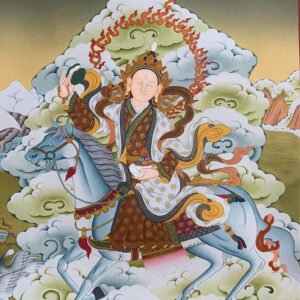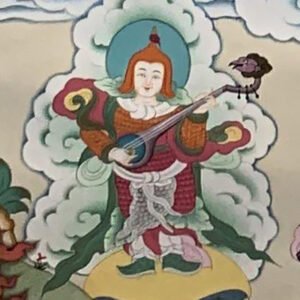Abhidharma
Tibetan: ཆོས་མངོན་པ།, Wylie: chos mngon pa, Sanskrit: Abhidharma. One of the three piṭakas (baskets) སྡེ་སྣོད་གསུམ།. The foundation of Buddhist psychology and logic. It describes the universe, the
Home > Glossary
Tibetan: ཆོས་མངོན་པ།, Wylie: chos mngon pa, Sanskrit: Abhidharma. One of the three piṭakas (baskets) སྡེ་སྣོད་གསུམ།. The foundation of Buddhist psychology and logic. It describes the universe, the
Tibetan: དོན་དམ་བདེན་པ་, Wylie: don dam bden pa, Sanskrit: paramārtha satya. Actual truth perceived through wisdom, without mental fabrications. Its characteristic is to be “beyond mind, unthinkable, inexpressible”
Tibetan: སློབ་དཔོན་, Wylie: slob dpon, Sanskrit: ācārya. Teacher. Equivalent of spiritual master or lama.

Tibetan: ཨ་ཕྱི་ཆོས་ཀྱི་སྒྲོལ་མ་, Wylie: a phyi chos kyi sgrol ma. The Dharma Protector (Dharmapāla) of the Drikung Kagyu school. Achi Chokyi Drolma is the grandmother of Jigten

Tibetan: ཆོས་སྐྱོང་, Wylie: chos skyong, Sanskrit: dharmapāla. Deities whose role is to protect the teachings and practitioners. See Dharmapalas in Figures
Tibetan: ཆོས་སྐུ་, Wylie: chos sku, Sanskrit: dharmakāya. Lit. Dharma Body. The emptiness aspect of Buddhahood. It can be translated as body of truth, absolute dimension. See list

Tibetan: ཉེ་བའི་སྲས་བརྒྱད།, Wylie: nye ba’i sras brgyad, Sanskrit: aṣṭa utaputra. Also known as Eight Great Bodhisattvas (Sanskrit: aṣṭamahābodhisattva). The main bodhisattvas in the retinue of
Tibetan: འཇིག་རྟེན་ཆོས་བརྒྱད་, Wylie: ‘jig rten chos brgyad, Sanskrit: aṣṭalokadharma. The normal preoccupations of unrealized people without a clear spiritual perspective. The eight ordinary (worldly) concerns
Tibetan: གྲུབ་ཐོབ་བརྒྱད་ཅུ་རྩ་བཞི་, Wylie: grub thob brgyad cu rtsa, Sanskrit: caturaśītisiddha. Mahasiddha is a term for someone who embodies and cultivates the “siddhi of perfection”, a

Tibetan: འཇིག་རྟེན་སྐྱོང་བ།, Wylie: ‘jig rten skyong ba, Sanskrit: Lokapāla. Also known as Four Great Kings (Tibetan: རྒྱལ་ཆེན་སྡེ་བཞི།, Wylie: rgyal chen sde bzhi, Sanskrit: Catur Mahārāja). The Guardians of the